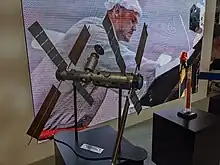Commercial LEO Destinations program
The Commercial LEO Destinations program (CLD, ou Commercial Destinations in Low Earth Orbit, or Commercial low Earth orbit (LEO) Development Program) is a public/private partnership program of the NASA, to help facilitate the building of private space stations in low Earth orbit.
Background
NASA must face the planned end of the International Space Station, whose deorbit is planned for the early 2030s. The agency therefore wants to have destinations in low Earth orbit ready to take over from the ISS. However, NASA no longer wishes to design, build and operate the stations but, rather, to be one of the customers who would use such a station if it were built and operated by private actors. NASA therefore proposed in 2021 to reuse the same formula used successfully for the delivery of cargo and crews to low orbit with the Commercial Orbital Transportation Services/Commercial Resupply Services (cargo transport) and Commercial Crew Development/Commercial Crew Program (transport crews).[1] Furthermore, NASA is focusing on operating its own lunar exploration projects: Lunar Gateway station, with contracts to private companies to develop and provide space suits (Exploration Extravehicular Activity Services program),[2] the placement of payloads onto the Moon (Commercial Lunar Payload Services program) and the landing of astronauts (Human Landing System program).
NASA has also begun a program, NextSTEP Appendix I, which has the aim to add additional modules to the ISS. Axiom Space won a 2021 bid process and was awarded a contract $140 million to build, and then attach, its modules to the International Space Station, the Axiom Orbital Segment[1] (which must then evolve as an autonomous station after the deorbiting of the ISS).
A previously projected part of the program, NextSTEP Appendix K, was to select standalone station projects but was canceled in August 2020.[3]
Setting up the program
In March 2021, NASA created the Commercial LEO Destinations program which aims to support the design, build and operation of private Earth-orbiting space stations in which the agency would be just one of the customers (tenant or other form of contract), with companies retaining ownership of their stations.[1]
Participants
Several companies are interested in the program including Airbus, Blue Origin, Boeing, Collins Aerospace, Firefly Aerospace, General Dynamics, ispace, Lockheed Martin, Moog Inc., Nanoracks, Northrop Grumman, Raytheon, Redwire, RUAG Space, Sierra Nevada Corporation, SpaceX, Virgin Galactic, Virgin Orbit, Voyager Space Holdings, and York Space Systems.[1]
The companies applying are:[4]
- Nanoracks
- Space Villages Inc.
- Northrop Grumman Systems Corporation
- Blue Origin
- Orbital Assembly Corporation (now Above: Space Development Corporation)
- Hamon Industries
- ThinkOrbital Inc.
- DEHAS Limited
- Maverick Space Systems Inc.
- SpaceX
- Relativity Space
Team selection
Three teams are selected in December 2021 to continue their work with agency grants (subject to approval by the United States Congress):[5][6][7][8]

- Nanoracks, associated with its majority shareholder Voyager Space and Lockheed Martin, is granted $160 million to develop its Starlab Space Station project,
- Blue Origin, associated with Sierra Space (carve-out from Sierra Nevada Corporation), Boeing and Redwire, is granted $130 million to develop its Orbital Reef project,
- Northrop Grumman, associated with Dynetics, is granted $125.6 million to develop its unnamed station.
Lockheed Martin withdraws from the Starlab project and is replaced by Airbus Defense and Space in 2023.
On October 4, 2023, Northrop Grumman announced that it was joining the Starlab project and abandoning its own station project. The company plans in particular to develop an autonomous docking system for its Cygnus cargo ship, which will resupply the station. The company had already received $36.6 million of the $125.6 million granted by NASA.[9]
Also in October 2023, it was made public by CNBC that the partnership between Blue Origin and Sierra Space could end, with the two companies refocusing on their priority projects, respectively the Blue Moon and the Dream Chaser. The team had already received $24 million of the $130 million granted by NASA.[10]
References
- Michael Sheetz (27 March 2021). "NASA wants companies to develop and build new space stations, with up to $400 million up for grabs". CNBC. Retrieved 4 August 2023.
- Jeff Foust (10 July 2023). "NASA awards "crossover" spacesuit task orders to Axiom and Collins". SpaceNews. Retrieved 4 August 2023.
- Jeff Foust (27 August 2020). "NASA puts solicitation for commercial free-flyer station on hold". SpaceNews. Retrieved 4 August 2023..
- "System for Award Management : Commercial Low-Earth Orbit (LEO) Destinations (CLD)". sam.gov. 27 January 2022. Retrieved 10 August 2023.
- "NASA Selects Companies to Develop Commercial Destinations in Space". NASA. 2 December 2021. Retrieved 4 August 2023.
- Jeff Foust (3 December 2021). "NASA awards funding to three commercial space station concepts". SpaceNews. Retrieved 4 August 2023.
- Eric Berger (3 December 2021). "NASA sets sail into a promising but perilous future of private space stations". Ars Technica. Retrieved 4 August 2023.
- Elizabeth Howell (3 December 2021). "NASA awards $415 million for private space stations amid ISS transition questions". NASA. Retrieved 4 August 2023.
- Jeff Foust (4 October 2023). "Northrop Grumman to join Voyager Space commercial space station project". SpaceNews. Retrieved 5 September 2023..
- Michael Sheetz (28 September 2023). "Blue Origin, Sierra Space weigh future of Orbital Reef space station as partnership turns rocky". CNBC. Retrieved 5 October 2023..